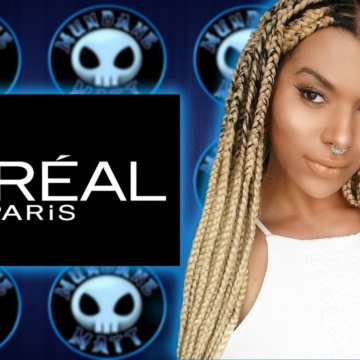- About
- Topics
- Picks
- Audio
- Story
- In-Depth
- Opinion
- News
- Donate
-
Signup for our newsletterOur Editors' Best Picks.Send
Read, Debate: Engage.
| located: | United Kingdom, France |
|---|---|
| editor: | Shira Jeczmien |
Last week L’Oréal almost became a “champion” of diversity, to paraphrase the company’s comments. That was until the global cosmetics conglomerate fired the face of their ‘True Match’ foundation campaign, transgender activist and model Munroe Bergdorf, over what they claim were racist comments.
In light of the Charlottesville violence, Munroe took to Facebook to express her views and experience, as a black and transgender woman, on the racism embedded in the veins and history of “ALL white people”, leading to her immediate contract termination with L’Oreal.
Munroe’s reflection was quickly removed from Facebook, but snippets of it were reserved from The Sun. “Most of ya’ll don’t even realise or refuse to acknowledge that your existence, privilege and success as a race is built on the backs, blood and death of people of colour,” she is quoted as saying. “Your entire existence is drenched in racism.”
L’Oreal, along with other seemingly progressive cosmetic brands are increasingly celebrating wider ranges of makeup shades that cater for all skin types. And as expected promoting this long overdue step toward inclusion of minorities in beauty products calls for models that represent an image of diversity.
In recent years we’ve seen brands taking their campaigns into realms of what’s political. This can be attributed to a world that in itself has shifted into a more political consciousness, with campaigns for equality and inclusion spanning continents. Yet here comes the moral dilemma behind such stances, particularly when taken on by multinational corporations whose ultimate goal is to generate exponential profit: when is diversity used as merely an image and how can it be a tool to carve real dialogue around diversity.
By sacking Munroe so rapidly, as though her comments and her own experience of prejudice need be swiftly swept under the carpet of the world wide web, L’Oreal solidified its stance of using diversity as a hollow image of Munroe as a trans person. Black here has been used as a marketing tool. Exactly the same can be said for her transgender identity. The cosmetic company has no interest in reshaping the beauty industry, nor creating dialogue around the thriving discrimination still present in our world, and this was demonstrated in their reaction.
By fearing Munroe’s reflection would be damaging for the neutral-cum-activist agenda the company wants so desperately to promote, L’Oreal has physicalized the precise unconscious racism Munroe expressed in her Facebook comments. Prejudice and discrimination aren’t just alive where it’s most obvious; in the violence of white supremacist protesters. It is a current that dictates our behaviour, that strokes our fears of speaking up. And it ultimately led to the dismissal of an important public voice and message.
